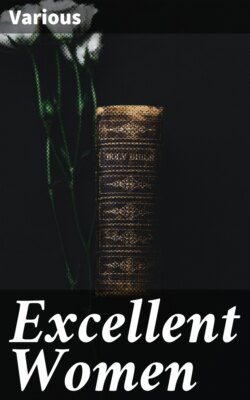Читать книгу Excellent Women - Various - Страница 20
На сайте Литреса книга снята с продажи.
FIRST SIGHT OF NEWGATE PRISON.
ОглавлениеIt was in 1813 that the attention of Elizabeth Fry was first directed to the condition of female prisoners in Newgate. At the beginning of that year four members of the Society of Friends had visited some persons about to be executed. One of the visitors, William Forster, asked Mrs. Fry if nothing could be done to alleviate the sufferings of the women, then living in the most miserable condition. The state of the prison was at that time disgraceful to a civilised country, even after all John Howard's labours. There were about three hundred women, with many children, crowded in four small rooms, badly lighted, badly ventilated, and with no bedding or furniture. They slept on the floor, some of the boards of which were partially raised, to supply a sort of pillow for rest; and here, in rags and dirt, the poor creatures cooked, washed, and lived. Prisoners, tried and untried, misdemeanants and felons, young and old, were huddled together, without any attempt at classification, and without any employment, and with no other superintendence than was given by one man and his son, who had charge of them by night and by day. When strangers appeared amongst them, there was an outburst of clamorous begging, and any money given went at once to purchase drink from a regular tap in the prison. There was no discipline of any sort, and very little restraint over their communication with the outside world, beyond what was necessary for safe custody. Oaths and bad language assailed the ear, and every imaginable horror distressed the eye of a stranger admitted to this pandemonium. Although military sentinels were posted on the roof of the prison, such was the lawlessness prevailing, that even the governor dreaded having to go to the female prisoners' quarters.
Into this scene, accompanied only by Anna Buxton, did Elizabeth Fry enter. Nothing was at the first visit done but giving warm clothing to the most destitute; William Forster having told of the wretchedness caused by the severity of the cold that January of 1813. What was then witnessed of the sad and neglected condition of these women and children sank deeply into the heart of the visitors, and Mrs. Fry formed the resolution to devote herself, as soon as circumstances permitted, to the work of prison reform, and improvement of the condition of female prisoners.
The work was not wholly new to her. When not sixteen years of age, she was deeply interested in the House of Correction in Norwich, and by her repeated and earnest persuasion she induced her father to allow her to visit it. She never forgot her experience there, and she afterwards said that it laid the foundation of her future greater work.
Several years were yet to elapse before the time came for taking up seriously the cause of prisons. These years were crowded with events of various kinds, both in the great world and in the little world of her own family circle. These events caused delays which we must suppose were needed for preparing more perfectly the instrument to be used in the great work. Every interval of time, amidst these years of busy and disturbed life, was occupied in some active and necessary work. There were meetings at various places, Westminster, Norwich, and also at Plaistow, after the removal to Plashet brought the family within its sphere. At most of the meetings she took part, both in the worship and in visiting the poor or the sick. Then there were family cares, troubles, and bereavements. The loss of little Elizabeth, the seventh child, was a sore trial, a child of much promise, and with wisdom and goodness beyond her years, early called to a heavenly home.
Her tenth child was born on the 18th of April, 1816, for whom she thus prayed with thanksgiving—"Be Thou pleased, O Lord God Almighty, yet to look down upon us, and bless us; and if Thou seest meet, to bless our loved infant, to visit it by Thy grace and Thy love; that it may be Thine in time, and Thine to all eternity. We desire to thank Thee for the precious gift."
After a visit to Norfolk, in consequence of the death of the only surviving son of her uncle Joseph Gurney; and to North Runcton, where her elder daughters were residing; and having placed her sons at school, she came to London, to commence the great work to which she now felt she must devote her life.
